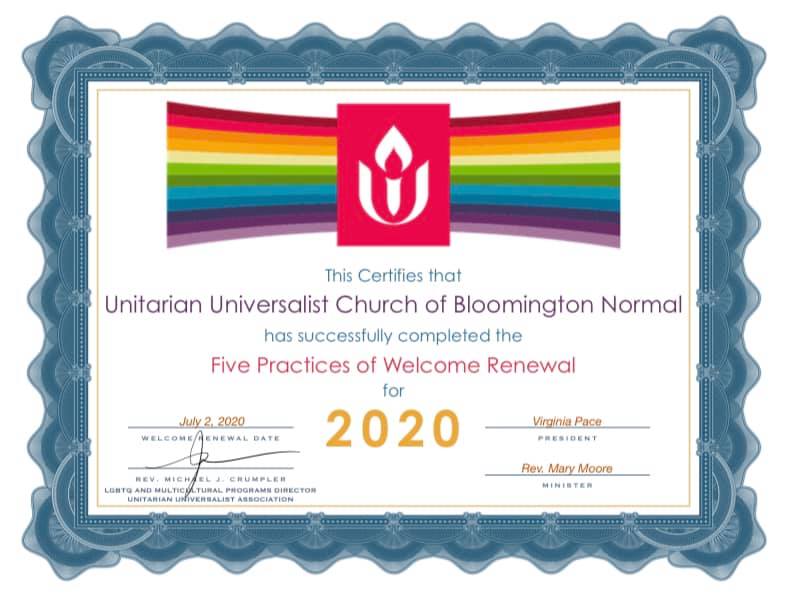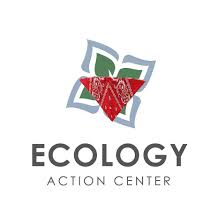About Us
What we believe
We are Unitarian Universalists
Policies and Procedures Handbook
You can download a PDF copy of the Policies and Procedures Handbook here.
Unitarian Universalist Principles & Sources
Unitarian Universalism affirms and promotes seven Principles, which we hold as strong values and moral guides. We live out these Principles within a “living tradition” of wisdom and spirituality.
- 1st Principle: The inherent worth and dignity of every person;
- 2nd Principle: Justice, equity and compassion in human relations;
- 3rd Principle: Acceptance of one another and encouragement to spiritual growth in our congregations;
- 4th Principle: A free and responsible search for truth and meaning;
- 5th Principle: The right of conscience and the use of the democratic process within our congregations and in society at large;
- 6th Principle: The goal of world community with peace, liberty, and justice for all;
- 7th Principle: Respect for the interdependent web of all existence of which we are a part.
Our spirituality is unbounded, drawing from scripture and science, nature and philosophy, personal experience and ancient tradition as described in our six Sources.
- Direct experience of that transcending mystery and wonder, affirmed in all cultures, which moves us to a renewal of the spirit and an openness to the forces which create and uphold life;
- Words and deeds of prophetic people which challenge us to confront powers and structures of evil with justice, compassion, and the transforming power of love;
- Wisdom from the world’s religions which inspires us in our ethical and spiritual life;
- Jewish and Christian teachings which call us to respond to God’s love by loving our neighbors as ourselves;
- Humanist teachings which counsel us to heed the guidance of reason and the results of science, and warn us against idolatries of the mind and spirit;
- Spiritual teachings of Earth-centered traditions which celebrate the sacred circle of life and instruct us to live in harmony with the rhythms of nature.
UUBN Constitution
The Constitution of the church was originally adopted in 1903. It’s been revised numerous times through the process set forth within the constitution itself.
Welcoming Congregation

We believe in “the inherent worth and dignity of every person.” This is our first principle, the one that our members proudly recite and share with others. However, in the 1980s and 90s, after realizing that many of the member congregations were not welcoming places for all people, especially with regard to gender and sexuality, the UUA launched the Welcoming Congregation Program to help us learn how to undo homophobia in our hearts and minds, our faith family, and our larger community.
The Five Practices of Welcome Renewal
The Five Practices of Welcome Renewal are benchmarks that every congregation will need to integrate into congregational life in order to ensure that lesbian, gay, bisexual, transgender, intersex, asexual, two-spirit, genderqueer, non-binary, and the like feel fully welcomed, centered, and embraced in our Unitarian Universalist congregation. Welcoming Congregations are required to meet the following benchmarks annually in order to remain “current” as a Welcoming Congregation.
1. Become a Welcoming Congregation
Becoming a Welcoming Congregation is the expectation of every Unitarian Universalist congregation. While over 800 congregations are currently “approved,” the nearly 300 congregations that are not are encouraged to fulfill the original objectives of the Welcoming Congregations application.
2. Welcoming Worship Services
The second Practice of Welcome Renewal is incorporating Welcoming Worship Services into our ordinary calendar of worship every year. These services might occur during LGBTQ+ Pride Month or any other day of observance. An LGBTQ marriage ceremony, naming ritual, or remembrance ceremonies may also fulfill this objective.
3. Welcoming Days of Observance
The third Practice of Welcome Renewal is an annual recognition and celebration of the Welcoming Days of Observance. These days and seasons are important to LGBTQ+ / TGQNB communities because they bring visibility and affirmation after generations of invisibility and erasure. These days remind all that “All of who you are is sacred. All of who you are is welcome.”
4. Welcoming Religious Education
The fourth Practice of Welcome Renewal is an annual opportunity for your congregation to experience a Welcoming Congregation Module. A WC module is a UUA approved seminar / webinar. Each year the UUA LGBTQ program office will offer at least one Welcoming Webinar engaging LGBTQ+ / TGQNB issues and topics. Welcoming Congregations may register for a webinar or may chose to sponsor a local seminar for its local congregation and community.
5. Support a Welcoming Project
The fifth Practice of Welcome Renewal is Support a Welcoming Project. Welcoming Congregations (WCs) are congregations that give generously of our gifts and resources. To remain current, WCs may donate a sizable donation to a local and national organization, campaign, or project that uplifts the dignity of LGBTQ+ / TGQNB communities.
Green Sanctuary

Almost 30% of all Unitarian Universalist congregations are accredited Green Sanctuaries, representing hard work and ever-ongoing action to bring congregational culture into greater alignment with environmental justice as an expression of faith, through social action, worship, education, and sustainable living. Learn more about the Green Sanctuary Program.
Green Sanctuary Team
The Green Sanctuary Team provides programs for the congregation and the wider community which build awareness of societal environmental issues, generate commitment for personal lifestyle changes, motivate the congregation to community action on environmental issues, and build awareness of and rectify environmental injustices.
In the Community
 The mission of the Ecology Action Center is to inspire and assist our community in creating, strengthening, and preserving a healthy environment. The EAC acts as a central resource for environmental education, information, outreach, and technical assistance in McLean County, Illinois. UUBN often hosts activities and learning sessions presented by the Ecology Action Center.
The mission of the Ecology Action Center is to inspire and assist our community in creating, strengthening, and preserving a healthy environment. The EAC acts as a central resource for environmental education, information, outreach, and technical assistance in McLean County, Illinois. UUBN often hosts activities and learning sessions presented by the Ecology Action Center.
Click on the logo to learn more about TerraCycle and local drop-off locations. TerraCycle’s purpose is to eliminate the idea of waste by creating national recycling systems for previously non-recyclable or hard-to-recycle waste.
